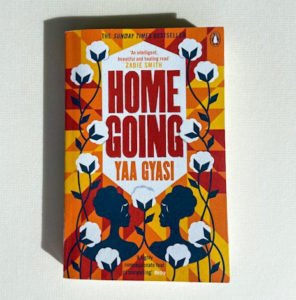This was the second Besos, Betty Bookclub read, and it was a good one. Homegoing, Yaa Gyasi’s debut novel, is an ambitious, sprawling narrative which spans seven generations of two families, split by the slave trade in the late 1700’s. This novel is immense; a family tree on the opening page becomes a very necessary reference as you move through the pages, meeting generation after generation of characters. Critics were quick to claim that Gyasi had effectively ‘bitten off more than she could chew’, but, speaking to the members of my bookclub, it became clear that this was not a popular opinion.
For many, this novel is an eye-opening alternative to the Western perspective of Africa we are often fed in the media. The opening chapters very much reminded me of Chinua Achebe’s great work, Things Fall Apart, but Gyasi tells the story of the burgeoning relationship between the African villages and the British traders from the perspective of the young African women coming of age amongst the turbulence.
In Gyasi’s story, two sisters from neighbouring African tribes, both from noble families, are split by actions that not only change their lives, but leave shockwaves down throughout their future generations. Both are sold into the slave trade – Effia, as a slave trader’s wife; Esi, as a slave – and both end up in the Cape Coast Castle, one of about 40 ‘slave castles’ built along the West Coast of Africa. While Effia enjoys the luxury of the upper floors; the ‘fine furniture made from wood the colour of her father’s skin, the silk hangings so smooth they felt like a kiss’, Esi languishes below, kept in inhuman conditions in the overcrowded dungeons.
Gyasi’s vivd description of the Cape Coast Castle’s dungeons were among the hardest to read in a book that is filled with generational trauma and heartache. She doesn’t protect her readers from the shocking history that took place in this grand old building (which can still be visited today) but rather forces you to acknowledge it. In this chapter Gyasi tells us about mothers whose babies were forcibly removed from their arms, women piled on top of each other in a cramped space, the only food they were given, a ‘mushy porridge’ which ‘passed straight through [them]’, the smell so bad that soldiers coming into the dungeons had to hold their noses to keep from vomiting. There is no escaping the atrocities that were carried out in that building, which would echo down through generations of misplaced, mistreated people.

While critics have complained that Homegoing tried to do too much, that in telling the stories of so many people, it failed to justice to any one of them, Gyasi’s answer can be found in the novel itself. In present day America, Marcus, the great-great-great-great grandson of Esi, is struggling to write his thesis:
‘Originally, he’d wanted to focus his work on the convict leasing system that had stolen years off his great-grandpa H’s life, but … how could he talk about Great-Granda H’s story without also talking about his grandma Willie and the millions of other black people who had migrated north, fleeing Jim Crow? And if he mentioned the Great Migration…, he’d have to talk about Harlem. And how could he talk about Harlem without mentioning his father’s heroin addiction… and if he wrote about crack, he’d inevitably be writing, too, about the “war on drugs”… And if he talked about why friends from his hood were doing five-year bids for possession of marijuana while nearly all the white people he’d gone to college with smoked it openly every day, he’d get so angry that he’d slam the research book down…’
Yaa Gyasi’s debut novel has achieved something mind-blowing. She introduces us to a new character in every chapter, yet does so with such empathy and skill that you immediately connect with them. And she tells the story – the whole story – of institutional, and generational racism in America and the Gold Coast. This novel brings to life the history that you were not taught in school. After putting it down, those without any lived experience of racism will have a whole new clarity of understanding on the recent events in the states and the global Black Lives Matter protests.
This book is an instant classic, and I am so excited to read Gyasi’s latest book, Transcendent Kingdom, which will be released in March next year.
